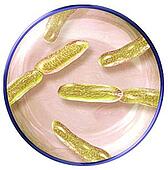 A Research carried out in Germany shows that our own immune system is protecting us silently from ravages of salmonella, a bug behind severe intestinal infections.Generally speaking, a healthy human will only fall ill if he or she consumes more than 100,000 salmonella bugs via contaminated food, such as eggs or meat.Typhoid, a disease also caused by salmonella, affects 16 million people annually and mortality rates reach 200,000, with children falling victim to the disease. Worldwide, 94 million people fall ill each year with acute gastroenteritis, and 155,000 of these die.
A Research carried out in Germany shows that our own immune system is protecting us silently from ravages of salmonella, a bug behind severe intestinal infections.Generally speaking, a healthy human will only fall ill if he or she consumes more than 100,000 salmonella bugs via contaminated food, such as eggs or meat.Typhoid, a disease also caused by salmonella, affects 16 million people annually and mortality rates reach 200,000, with children falling victim to the disease. Worldwide, 94 million people fall ill each year with acute gastroenteritis, and 155,000 of these die.Tropical and sub-tropical countries in particular, where various sub-species of salmonella are common, are experiencing a rapid increase in resistance to antibiotics, with children being the most vulnerable, the journal Science reports.A team of researchers, led by Ivan Dikic from the Goethe University in Frankfurt, Germany, has now found out how body cells recognise salmonella and render it harmless, according to a Goethe statement.Salmonella infection begins with bugs entering the epithelial (outer) cells of the intestine. Then special cell organelles (specialised subunits within a cell), encircle the invaders and become absorbed in other organelles which have special digestive enzymes to break down the bacteria into their constituent parts.But how exactly do the organelles recognise salmonella? Dikic and his group at the Biochemistry Institute II have shed light on this mechanism. The salmonella are marked as `waste material` by the molecule ubiquitin, setting off a process that results in its destruction.
In Germany, approximately 30,000 cases of gastro diseases were reported in 1985, but by 2005 the figure had risen to 52,000.
Source:IANS


No comments:
Post a Comment